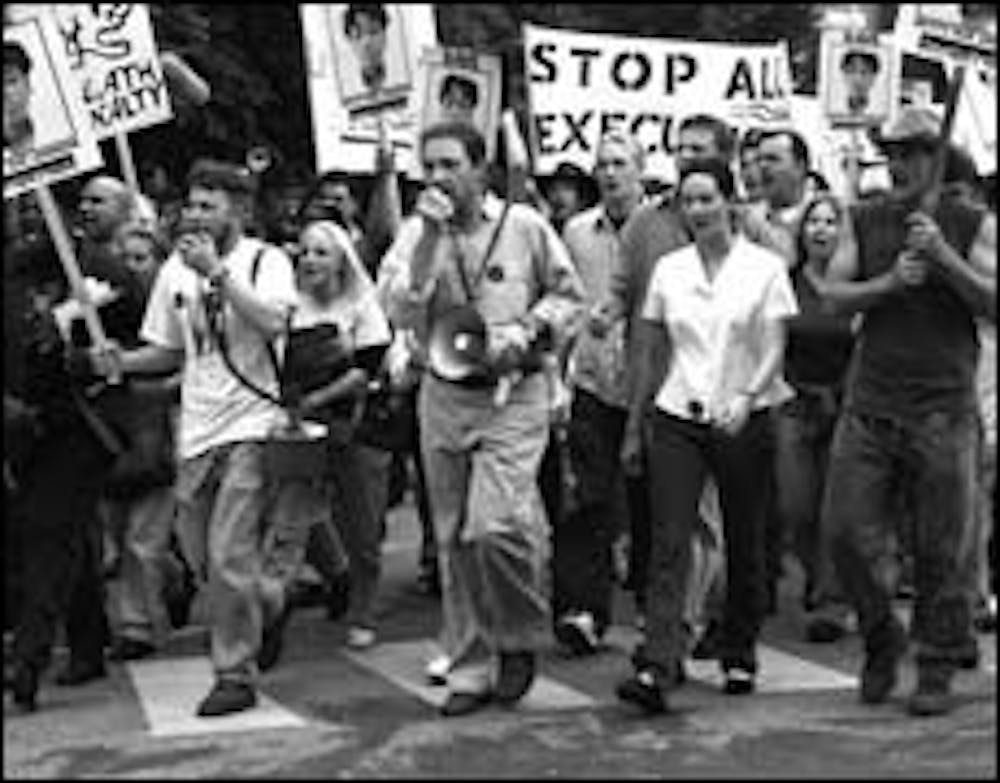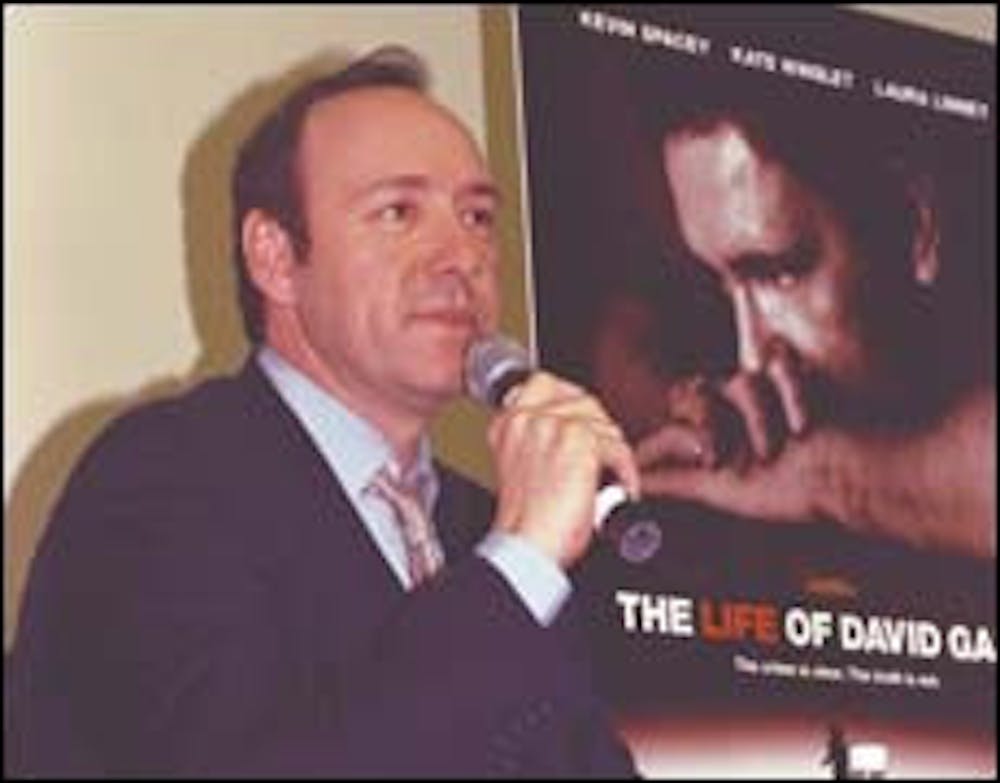Kevin Spacey wants you to think about the death penalty in America - as long as you wait until well after the final credits of his latest film.
In The Life of David Gale, in theaters Friday, Spacey plays a college professor and passionate crusader against the death penalty who, in a strange turn of events, ends up on death row himself. The movie operates from the common assumption that a flawed system will kill innocent people. But it also asks the tough question: How can you prove that someone is innocent?
Spacey, who researched the death penalty in depth as he prepared for the film, says he has probably thought about the issue more than the average American has. In addition to his role as David Gale, he has also played famous lawyer Clarence Darrow in an American Playhouse TV movie. Darrow, Spacey says, was very "eloquent" on the subject of the death penalty.
Many of Spacey's other roles also have some connection to capital crimes. He played depraved killers in Seven and The Usual Suspects, and murder victims in American Beauty and L.A. Confidential. But Spacey, despite his knowledge and experience, calls the death penalty issue "decidedly uncomfortable," and still sits on the fence when it comes to the state-sanctioned execution of convicted criminals.
"I hover in the middle," says the two-time Oscar winner, who recently discussed The Life of David Gale in a question-and-answer session with ASU students last month. "But I've never had my sister murdered, so I really don't know [how I would react]."
Spacey contends, however, that his personal view on the death penalty is unimportant in terms of the movie. He says that the film is less about taking a particular stance on the thorny topic and more about evoking discussions and debates within audiences. Spacey believes that the public's opinion about the death penalty is often based on emotion, rather than fact, and he hopes the film can spur some rational debate.
At the same time, Spacey firmly declares that he and the filmmakers want people to approach the movie as a thriller with a compelling story rather than as a political film.
"We are not trying to be polemical or speechmaking. The entertainment value is the number-one priority of the movie. Hopefully the polemics won't outweigh the entertainment value of the film," he says.
The Life of David Gale is directed by Alan Parker, who has made many movies about social injustice, including Mississippi Burning [1988], about the murder of three civil rights activists in 1964 Mississippi, and Come See the Paradise [1991], about the internment of Japanese-Americans in so-called relocation camps during World War II.
Spacey, who had wanted to work with Parker for some time, was confident that the director would emphasize entertainment while still illuminating the movie's social issues. Spacey believes that Parker's films about social injustice are effective because the director concentrates on telling a solid story rather than preaching themes from a cinematic soapbox.
"Whenever [Parker] does a film that's got that axis of injustice or conflict, I think he does the most incredible work because the politics get subverted. He manages to completely focus on the characters, and so you follow the emotions and the decisions of these characters," Spacey says. "The politics are there and they are certainly prominent, but it doesn't become a banner in your face."
After George Clooney [who was originally slated to play David Gale] dropped out of the film, Spacey sat down with Parker to address some of his anxieties about the script.
"I had some questions and concerns about what the film was saying, but after a couple of conversations with Parker, I thought, 'I've got to do this,'" Spacey says.
The character that Spacey plays in The Life of David Gale is close in temperament to the edgier Spacey characters that audiences have embraced in such films as Glengarry Glen Ross, Swimming with Sharks and the hugely-popular American Beauty. Spacey admits that David Gale is an edgy character and that some of the decisions that he and other characters make in the film are controversial and challenging.
"I wonder, if people knew at the beginning of the movie, the decisions [the characters] make by the end of the film, would they invest as much emotion in these characters as we hope they do?" he says.
Spacey, who continues to feel "enormously blessed" to make his living as an actor, says that he adopts a neutral stance that allows him to sometimes play controversial and unlikable characters.
"I don't judge the characters that I play; I don't take a moral position on them. They might do things that I wouldn't do. They might have thoughts and politics and ideas and feelings that aren't mine. You try to do things that are a powerful and interesting story. But it doesn't have to relate to your own life and it doesn't have to be your own experience," Spacey says.
Spacey says that he isn't worried that audiences may pigeonhole him politically based on his portrayal of David Gale.
"I think audiences are pretty intelligent. I don't think that people looked at the performance I gave in Seven and said that I am supporting the idea of serial killers," he says. "We have to try it keep it in context: it's just a movie. People can read into anything they want."
Although, Spacey adds that he thinks it is possible that some people will stay away from the movie based on political attacks they hear in the media.
"I will find it very interesting to see whether this film is reviewed as a movie, or if it's reviewed on the basis of the reviewer's position on this issue. I suspect that we will take some hits, and those [opinions or biases] will shape perception," the actor says.
The way in which the media heavily influences public perception on difficult issues such as the death penalty is a major theme in the movie. In the film, David Gale tells a reporter, played by Kate Winslet [Titanic] that "no one who looks [at me] sees a person; they see a crime." Gale means that a wrongly convicted person is often doomed because of his or her public condemnation in the media.
"People in the media are aware that they are in a position to shape public opinion. They are in a position also to invent and to tease and to imply and to do a lot of things without stating any facts. You can lead anyone in any particular direction," he says. "Because the media monster needs to be fed, you don't have as meticulous an approach [with stories]. Fact checking in a lot of cases doesn't happen."
This is why Spacey, who says he has read a lot of wildly untrue things about himself in the media, reiterates that he wants people to withhold judgment about his ideas and think about the movie's ideas instead.
"I'm reluctant to carve out my position because ultimately it's not important," Spacey says. "What's important is that you try to present something to an audience to allow them to make up their own conclusions."
Reach the reporter at michael.b.green@asu.edu.
| 'The Life of David Gale' Starring Kevin Spacey and Kate Winslet. Directed by Alan Parker. Opens Friday. |





